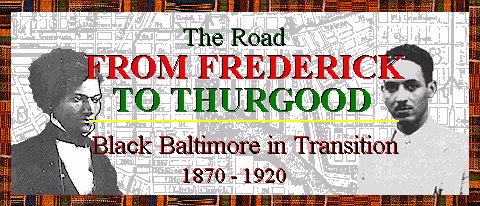 |
"Up and Doing and Trying":Harvey Johnson as Pastor |
 |
"Up and Doing and Trying":Harvey Johnson as Pastor |
That the time has fully come when we as Colored Baptists should establish and maintain our own denominational institutions, as Colored Baptists, is the true, deep and solemn covniction of many of the brethren, and I am of the same conviction.- Rev. Dr. Harvey Johnson, 1897 |
 Union
Baptist Church, traces its origins to 1852 and a group of fifty-seven worshipers
meeting in a small building on Lewis Street near Mullikin. The first pastor
of the church was the Reverend John Carey. In 1866, the Lewis Street congregation
merged with members of Saratoga Street African Baptist Church, forming
Union Baptist Church. When Harvey Johnson arrived in 1872, he found a modest
congregation of perhaps 270 members. Most disturbing was the fact that
the small nunber in this single church represented more than half the state's
total Baptists among blacks. During his time Johnson was develop Baptism
in Baltimore and state-wide to levels rivalled by few around the world.
Within two years, Harvey Johnson's leadership (combined with the substantial
growth of the city's black population) saw Union's membership leap to five
hundred. Perhaps more importantly, the church's coffers prospered, and
Harvey Johnson moved Union toward greater financial independence for the
overseeing denominational authority, the Maryland Baptist Union Association.
Missionary work guided by Union Baptist Church was begun in Frederick and
Carroll Counties.
Union
Baptist Church, traces its origins to 1852 and a group of fifty-seven worshipers
meeting in a small building on Lewis Street near Mullikin. The first pastor
of the church was the Reverend John Carey. In 1866, the Lewis Street congregation
merged with members of Saratoga Street African Baptist Church, forming
Union Baptist Church. When Harvey Johnson arrived in 1872, he found a modest
congregation of perhaps 270 members. Most disturbing was the fact that
the small nunber in this single church represented more than half the state's
total Baptists among blacks. During his time Johnson was develop Baptism
in Baltimore and state-wide to levels rivalled by few around the world.
Within two years, Harvey Johnson's leadership (combined with the substantial
growth of the city's black population) saw Union's membership leap to five
hundred. Perhaps more importantly, the church's coffers prospered, and
Harvey Johnson moved Union toward greater financial independence for the
overseeing denominational authority, the Maryland Baptist Union Association.
Missionary work guided by Union Baptist Church was begun in Frederick and
Carroll Counties.
Perhaps the most visible sign of the church's spiritual and financial prosperity were the number of splinter congregations produced from within its congregation. Unionites formed the Macedonia Baptist Church in September 1874, Perkins Square Baptist Church in 1879, and nearly two dozen others throughout the late-19th century. By 1885, with Rev. Johnson well respected statewide, Union Baptist's membership surpassed two thousand members for the first time.
Harvey Johnson's dealings with the Maryland Baptist Maryland Baptist Union Association (MBUA) in particular, and with prejudiced white Baptists in general, served as a proving ground for his leadership and vision. He took the skills honed in the battle for equality among all Baptists and transfered those skills as he entered the fight for equaliy among all people. Johnson's original cause of friction with the MBUA stemmed from its paternalistic approach to blacks and black Baptist churches. Not only did black ministers categorically receive less pay than white counterparts, but black churches were slow to realize full and equal political priviledges within the state denomination governing apparati. This problem was more troubling once, thanks in no small part to Johnson himself, black numbers in the state's Baptist churches began grow.
Rev. Johnson's response to this discrimination was two-fold: economic independence, institutional autonomy. This situation exploded throughout the 1890s as Johnson urged black congregations to free themselves of white purse strings, and to get out of the Union Association altogether. One of Rev. Johnson's most controversal speeches brought this issue to fore. In September 1897, speeking in Boston, Johnson made, "A Plea For Our Work As Colored Baptists, Apart From the Whites." Johnson called for black Baptists to move as a group toward self-determination. He believed black abilities and white failures made this necessary. Blacks had demonstrated in the administration of their churches, and the growth of the ranks among the Baptist faithful (one half of the total in the nation) that they were capable and deserving. In spite of the inability and/or unwillingness of some blacks to push the limits of the segregated world, "there are others," he proclaimed, "who are up and doing and trying to make the most of the means that are within their reach." More importantly, while whites were quick to point out the inter-racial cooperation displayed among black and white baptists for the cause of black education, Johnson described the lack of an agenda on the part of white Baptists for issues relevant to blacks outside of education as dissappointing. "Why is the proposition never made to us," asked Johnson, "of the necessity of co-operating in the work of abating the many forms of legal and socially oppressive laws and custons now in vogue all over the country, both North and South?" Similar in motivation and response to Richard Allen's movement in a different denomination, in an earlier century, Rev. Dr. Harvey Johnson followed his "plea," with the organization of the Colored Baptist Convention of Maryland in 1898.
|
Tell Us What You Think About the Maryland State Archives Website!
|
© Copyright February 03, 1998 Maryland State Archives